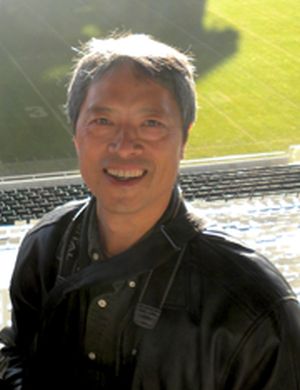Chen Named Fulbright Global Scholar
April 7, 2021
 In his quest to explore the causes and consequences of global climate change in the context of human influences in different regions, Dr. Jiquan Chen understands the importance of cross-lab, cross-country collaborative research. Knowing that the Fulbright Global Scholar Program is one of the few programs that provides scholars with the opportunity to build direct connections, Chen, a professor in the Department of Geography, Environment, and Spatial Sciences and the Center for Global Change and Earth Observations at Michigan State University, applied to the prestigious program hoping to take advantage of the ability to work collaboratively with other scholars in targeted regions.
In his quest to explore the causes and consequences of global climate change in the context of human influences in different regions, Dr. Jiquan Chen understands the importance of cross-lab, cross-country collaborative research. Knowing that the Fulbright Global Scholar Program is one of the few programs that provides scholars with the opportunity to build direct connections, Chen, a professor in the Department of Geography, Environment, and Spatial Sciences and the Center for Global Change and Earth Observations at Michigan State University, applied to the prestigious program hoping to take advantage of the ability to work collaboratively with other scholars in targeted regions.
With the knowledge that the award is the most competitive among all of the Fulbright programs, as only one to two scholars from each discipline are selected to represent the U.S. in a given year, Chen was thrilled to receive word of his award. “I am humbled at being selected to represent the U.S. as an ambassador of goodwill, openness, and readiness toward international collaboration,” Chen said. “I also plan to be an advocate for MSU as a global university and plan to promote our global connections. I am grateful to the leadership within the MSU International Studies and Programs, the College of Social Science, and my department for their support. I plan to use this opportunity to promote direct collaborations between MSU and several universities in Europe and Australia.”
The Fulbright Program offers grants to study, teach and conduct research for U.S. citizens to go abroad and non-U.S. citizens to come to the United States. The program fosters mutual understanding between the United States and partner nations. Through unique international educational and cultural exchange programs, Fulbright’s diverse and dynamic network of scholars, alumni, and global partners share knowledge across communities and improve lives worldwide.
A native of Shanxi in Northern China, Dr. Chen is one of the leading ecosystem scientists and geographers in the world. In this era of extensive and rapid environmental impacts, Chen’s research lies at the cutting-edge of ongoing efforts to measure and monitor the pace and spatial distribution of change. He received his undergraduate education in grassland ecology from Inner Mongolia University, an M.S. in forest ecology from the Chinese Academy of Sciences, and a PhD in ecosystem analysis from the University of Washington. His postdoc training was in stream ecology and ecosystem management. He was a Bullard Fellow at Harvard University and served on the faculty at Michigan Tech University (1993-2001) and the University of Toledo (2001-2014). After arriving at MSU in 2014, Chen received the William J. Beal Outstanding Faculty Award in 2020 for his many accomplishments as a scholar and mentor and his extensive service to MSU and his profession.
Chen is also a fellow of the American Association for the Advancement of Science and the Ecological Society of America. He is the Editor-in-Chief for Ecological Processes (Springer Nature) and a book series of Ecosystem Science and Applications (HEP & MSU Press). Chen is the founder and the chief scientist of the US-China Carbon Consortium (USCCC). He is also a member of the MSU Ecology, Evolutionary Biology, and Behavior (EEBB) Graduate Program and the Environmental Science & Policy Program (ESPP).
As part of his Fulbright Global Scholar experience, Chen will spend two to three months at host labs in Australia and Germany. Labs at Australia’s National Science Agency, the Commonwealth Scientific and Industrial Research Organisation (CSIRO) Climate Science Centre, and the Department for Sustainability Landscape Development at Martin Luther University Halle-Wittenberg in Germany will serve as hubs in his efforts to build a network of scholars for promoting the research frontiers of global warming potentials, and ecosystem services of managed landscapes. “I plan to visit other research centers and universities in these countries, as well as those in Italy, France, New Zealand, Japan, and other locales. One of my goals is to organize two corresponding synthesis workshops by inviting scholars from MSU and other U.S. institutions to work toward a global synthesis of these topics,” Chen said.
In addition to establishing direct collaborations with labs from multiple countries, Chen plans to promote MSU’s global education programming. “During my visit, I also plan to discuss and finalize an ambitious textbook on “Modern Scientific Hypothesis and Experimental Design across Scales.” This text will challenge the Newtonian dogma for conducting science and its application in broadly defined environmental science.” If successful, the text could have long-lasting effects in many disciplines of environmental sciences.

